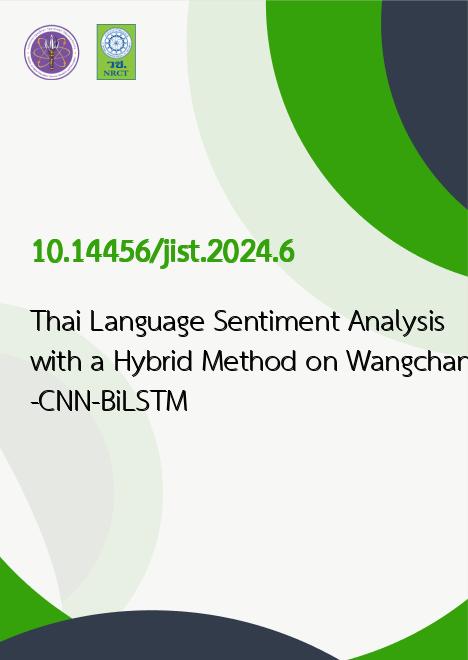
|
Thai Language Sentiment Analysis with a Hybrid Method on WangchanBERTa-CNN-BiLSTM |
|---|---|
| รหัสดีโอไอ | |
| Creator | Kasidhit Suraratchai |
| Title | Thai Language Sentiment Analysis with a Hybrid Method on WangchanBERTa-CNN-BiLSTM |
| Contributor | Suronapee Phoomvuthisarn |
| Publisher | The Association of Council of IT Deans (CITT) |
| Publication Year | 2567 |
| Journal Title | Journal of Information Science and Technology |
| Journal Vol. | 14 |
| Journal No. | 2 |
| Page no. | 1-11 |
| Keyword | Sentiment Classification, Deep Learning, Natural Language Processing, Convolutional Neural Network, Bi-LSTM, Thai Language |
| URL Website | https://tci-thaijo.org/index.php/JIST |
| Website title | Journal of Information Science and Technology |
| ISSN | 2651-1053 |
| Abstract | Understanding emotions conveyed in text, especially in non-global languages such as Thai, sentiment analysis is particularly important in Thailand. However, this endeavor faces challenges due to variations in text length, which significantly impact sentiment analysis outcomes. Previous research has employed neural network and machine learning models in the process, yet each model specializes in different aspects, making comprehensive sentiment analysis coverage unattainable. Recent research has delved into hybrid models like CNN-BiLSTM and BiLSTM-CNN. Although they demonstrate efficacy, their performance still varies across different datasets. For instance, CNN-BiLSTM excels with short sentences by considering surrounding word context, while BiLSTM-CNN is more effective with long sentences due to its bidirectional learning capability. While showing promise, these models perform effectively, but varied text lengths in datasets often lead to sentiment misinterpretation. To address these challenges, inspired by recent advances, we propose an innovative solution: the Parallel Hybrid model. This approach integrates WangchanBERTa into both CNN-BiLSTM and BiLSTM-CNN architectures, harnessing ensemble techniques to improve overall performance and adaptability. Our experiments, conducted on datasets like Wisesight, a highly imbalanced dataset with mostly longer texts, and Thai Children's Tales, a less imbalanced dataset with mostly shorter texts, confirm the effectiveness of the Parallel Hybrid model, which outperforms other model configurations with Macro F1 scores of 0.6270 and 0.7859, respectively. This research marks a significant advancement in sentiment analysis for the Thai language. |
